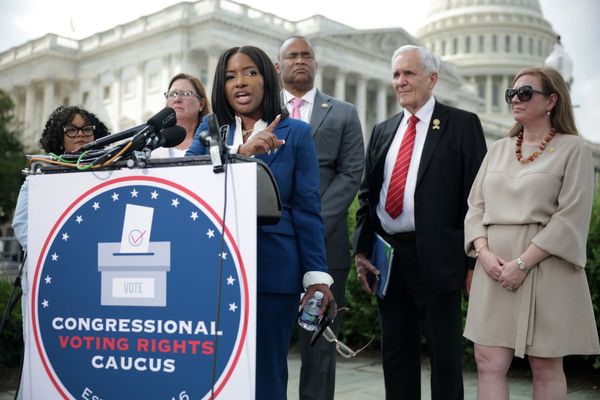Texas House Redistricting Hearing in Houston Draws Criticism Over Lack of Maps
/https://static.texastribune.org/media/files/c848b674aa0a1980107a227dc1d3a436/0726%20Houston%20Redistrict%20Hearing%20DV%2024.jpg)
The Texas House redistricting committee's recent hearing in Houston on Saturday, July 26, has sparked widespread criticism due to the absence of proposed redistricting maps. Hundreds of individuals who had signed up to testify were left unable to provide specific feedback on how potential changes would impact their communities and voting power.
Democratic Lawmakers Express Frustration

Democratic members of the Texas House, including Representatives Jolanda Jones and Armando Walle of Houston, voiced their discontent and confusion during the hearing. They highlighted the contradiction between Republicans' previous defense of the 2021 maps as "race blind" and their current claims that these same maps are now illegal.
U.S. Rep. Sylvia Garcia (D-Houston) firmly stated her opposition, saying, "My answer is hell no, we don't need to be doing this."
Chair Vasut Assures Future Opportunity for Public Input

Committee Chair Cody Vasut (R-Angleton) responded to the criticism by stating that follow-up public hearings would be scheduled once the maps are filed. He assured the public that they would have ample opportunity to voice their opinions and concerns, promising "1,000%" opportunity to speak.
Focus on Key Congressional Districts

The current redistricting effort is primarily targeting a handful of congressional districts, predominantly held by Black or Latino Democrats. Three of these districts are located in the Houston area, specifically TX-9, TX-18, and TX-29. The fourth district under scrutiny is TX-33, represented by U.S. Rep. Marc Veasey (D-Fort Worth).
Trump's Influence on Redistricting

This mid-decade redistricting initiative is widely perceived as being driven by former President Donald Trump's desire to bolster the number of Republican seats in the U.S. House ahead of the 2026 midterm elections.
DOJ Letter Cites "Unconstitutional 'Coalition Districts'"

Texas Governor Greg Abbott cited "constitutional concerns" raised in a letter dated July 7 from two Trump administration appointees at the U.S. Department of Justice (DOJ). The letter alleges that the four districts in question "currently constitute unconstitutional 'coalition districts'" and urges Texas to rectify these "race-based considerations."
Democrats Explore Counter-Strategies

In response to the redistricting efforts, Democrats are exploring potential counter-strategies, including the possibility of retaliatory redistricting in states with Democratic strongholds like California and New York. House Democratic Leader Hakeem Jeffries and California Governor Gavin Newsom have publicly discussed this option, though it faces significant legal hurdles.
Existing Legal Challenges to 2021 Maps

The existing maps, drawn in 2021, are already subject to several lawsuits filed by civil rights groups alleging racial gerrymandering. A trial concluded in El Paso last month, but a ruling is still pending. Critics argue that the special session and the DOJ letter contradict the state's previous defense of the maps as "race blind."
Upcoming Hearings Scheduled

The Texas House Redistricting Committee has another hearing scheduled for Monday, July 28, in Arlington.
Key Dates in the Redistricting Process

Several key events have marked the progress of the redistricting process:
- July 7, 2025: The U.S. Department of Justice sends a letter to Governor Abbott and Attorney General Paxton regarding "unconstitutional 'coalition districts.'"
- Early July 2025: Governor Greg Abbott adds redistricting to the special legislative session agenda.
- July 24, 2025: The Texas House redistricting committee holds its first public hearing in Austin.
- July 26, 2025: The Houston hearing takes place, drawing significant criticism due to the lack of maps.
- July 28, 2025: The House redistricting committee will hold a hearing in Arlington.
- 2026: Midterm elections, in which all 38 U.S. House districts in Texas will be on the ballot.
Understanding the Context and Key Stakeholders

Redistricting is the process of redrawing electoral district boundaries, typically conducted after a decennial census to account for population changes. While traditionally done post-census, Texas law allows mid-cycle redistricting at the discretion of the governor and legislature.
Key stakeholders involved in this process include:
- Texas Legislature: The House Committee on Redistricting, chaired by State Rep. Cody Vasut (R-Angleton), is spearheading the effort.
- Governor Greg Abbott (R): Called the special session for redistricting, citing the DOJ letter.
- Former President Donald Trump: Reportedly pushing Texas Republicans to redraw maps to secure more GOP House seats.
- U.S. Department of Justice (under Trump Administration): Issued a letter alleging unconstitutional "coalition districts."
- Democratic Lawmakers: Strongly oppose the redistricting, viewing it as a partisan maneuver.
- Civil Rights Groups: Have already filed lawsuits challenging the 2021 maps, alleging racial gerrymandering.
- Texas Residents: Hundreds attended the Houston hearing to voice concerns.
Allegations of Partisan Gerrymandering and Dilution of Minority Voting Power

Critics, primarily Democrats and civil rights groups, argue that this mid-decade redistricting is a "power grab" designed to further solidify Republican power and disenfranchise minority voters, particularly Black and Latino communities, by diluting their voting strength.